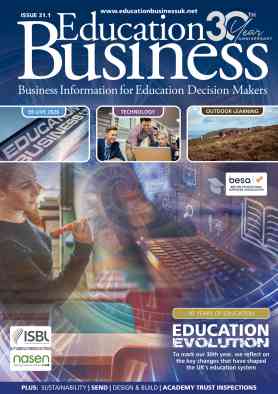Zooming in on professional learning
 Research shows that ensuring good professional development for all staff is one of the most effective ways to improve outcomes for all students. In a New Zealand study, classes where the teachers had taken part in high-quality professional development were improving twice as fast as those in other classes. Even more startlingly, the 20 per cent of pupils who were deemed the ‘least able’ made improvements four to six times faster than their peers in other classes. This shows that as well as improving pupil outcomes, it particularly improves the outcomes of those pupils most in need.
Research shows that ensuring good professional development for all staff is one of the most effective ways to improve outcomes for all students. In a New Zealand study, classes where the teachers had taken part in high-quality professional development were improving twice as fast as those in other classes. Even more startlingly, the 20 per cent of pupils who were deemed the ‘least able’ made improvements four to six times faster than their peers in other classes. This shows that as well as improving pupil outcomes, it particularly improves the outcomes of those pupils most in need.
More generally, a 2007 study of several randomised controlled trials of well-designed CPD suggested it had an average Effect Size of +0.56, which would put it in the ‘High’ effectiveness grouping in the Sutton Trust-EEF Teaching and Learning Toolkit.
Apart from the important pupil benefits, effective professional learning has also been shown to build teacher morale. A 2013 OECD study noted that England has one of the youngest teaching workforces in the world, especially at primary school, which has far‑reaching implications for school leaders who are trying to recruit and retain the best staff. With 20 per cent of our secondary teachers aged under 30, we have the second youngest workforce after Indonesia.
With such a high proportion of young teachers, our recruitment and teacher training is working, but our retention of teachers is not to the same extent. Supporting teachers and ensuring teacher morale has to be a priority. Beginning teachers need to be continually supported and developed upon completing their training and all staff need to feel supported and grown to keep meeting the needs of their pupils. International research shows the following themes have a positive effect on pupil outcomes and teacher learning:
Pupil Focused
The most effective professional development focuses on specific areas of learning or behaviour, rather than simply aiming to change the way the teacher practises. For example, ”improving history essay structure for EAL pupils through targeted use of formative feedback” rather than simply “improving assessment for learning” leads to more focused professional learning, which makes it easier for the participant to evaluate and refine their approach. It’s important to try to help teachers and staff see the link between the CPD they’re taking part in and the impact it will have on their pupils.
Collaborative
When a team of teachers jointly tackle a professional learning activity, then the ensuing debate, discussion and developing relationships strengthen the effectiveness of the experience. Triads are often particularly powerful to ensure that there are enough different viewpoints and support.
Relevant and differentiated
Nothing is more off-putting than being forced to attend training that is irrelevant to your current work and/or too hard or too easy. Teachers need enough support and challenge to be able to go away and try ideas out as soon as possible and then come back for further discussion. However, if this is taken too far and every teacher does something different then you lose the opportunity to develop a shared language and understanding of pedagogy.
Sustained and cycled
Research suggests that, on average, only those professional development processes that lasted for at least 30 hours had any sustained positive impact on pupil learning. This time includes training, discussion, teaching, reflection, observation and informal thinking. It’s easy to see that if school staff members are undertaking six different strands of CPD every year then it is unlikely that any will make a long-term impact.
Evaluated
We know that pupils need regular formative feedback in order to improve their understanding and skill. The same is absolutely true of teachers, who need to be able to objectively assess the impact they are having and refine/adapt their approach.
Challenging as well as informative
Some of the most powerful learning occurs when professional development causes a teacher to re-evaluate their fundamental beliefs around mechanisms of learning and effective teaching. CPD that is merely enjoyable ‘fluff’ with lots of tips and tricks is unlikely to lead to a significant and fundamental change in practice.
What can leadership do to facilitate effective CPD?
Prioritise time and resources. Irrelevant or ineffective professional learning costs in terms of time and resources, but doesn’t have the desired impact. Ensure that you are using effective modes of professional learning and then invest in them – it is the best way to improve pupil outcomes.
Ensure that staff are supported to collaborate, reflect and evaluate their learning in a sustained and powerful way. Consider applying for funding and grants where available and allocating funding where possible – many schools have used part of their pupil premium funding where relevant, for example.
Help teachers identify their own goals for pupil learning
Pupil-focussed professional learning is more powerful and staff are more engaged when their CPD is linked to learning issues they are inspired about. Help colleagues use the school and departmental development plans to identify a few areas for development that motivate them. Keep the focus on pupils’ learning needs at all times.
Identify expertise and ensure it is evidence informed
It is becoming common for schools to decide that all training and development will happen internally. However, research strongly supports the idea that external challenge and support is absolutely vital if you want to raise standards as well as reduce variation. Staff may wish to locate research papers, books, expert colleagues in other schools or departments, consultants or courses, or even ideas and support through Twitter. However, it is crucial to ensure that any external expertise is underpinned by evidence – be prepared to ask “what’s the evidence that this will be more effective?”
Sustain and evaluate
In order to effectively address pupils’ learning needs, teachers need to keep practising, adapting and refining their new ideas regularly, for at least two terms and ideally longer. Any less than this and you risk the ideas being adopted only superficially and any improvements in learning being lost when the focus shifts.
A clear focus for their CPD then becomes much easier to evaluate the effect of their work. This assessment should take place regularly in a formative way, as well as helping school leaders ensure that value for money is being delivered.
Learn from other schools
Schools across the country are dealing with similar pressures and challenges to you. Ensure that you learn from them as much as possible. Social media, local and national networks will enable this. Networks such as the National Teacher Enquiry Network, which is specifically focussed on CPD, and Whole Education allow you to meet and learn from other schools.
Lead by example
The most effective schools create a culture where learning is openly modelled by all senior staff, where experimentation and research are actively encouraged and supported, and where even the most experienced teachers are open to constructive feedback. When senior leaders become ‘lead learners’ who are willing to take risks and make themselves vulnerable then this permeates through the school and creates an effective CPD culture.
About the TDT
The Teacher Development Trust is an independent charity, founded by teachers, dedicated to improving the educational outcomes of children by ensuring they experience the most effective learning. The organisation is raising awareness of the importance of professional development and building tools to help teachers to transform their practice and achieve success for all their pupils. The Trust believes that demand for professional learning should be driven by the aspiration teachers have for the children they teach and the passion they bring to their work.
Further information
www.tdtrust.org
Latest News
26/01/2026 - 10:40
The proposed Scottish Budget for 2026-27 commits up to £200 million to the Scottish Attainment Challenge.
26/01/2026 - 10:24
The Welsh Government has set out the key challenges facing tertiary education in Wales and has launched a call for evidence to help address these challenges.
23/01/2026 - 10:47
Almost half (45%) of school leaders needed mental health and well-being support in just a year, a new survey from union NAHT has found.
22/01/2026 - 10:44
The film, ‘The Lunch They Deserve’, seeks to focus the nation on the need for better school food standards before the provision of Free School Meals is extended.
21/01/2026 - 11:24
Speaking at the Bett UK Conference, the Education Secretary said the EdTech Testbed will recruit schools and colleges to put the latest tech and AI tools through their paces.







